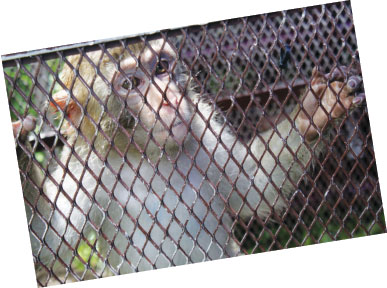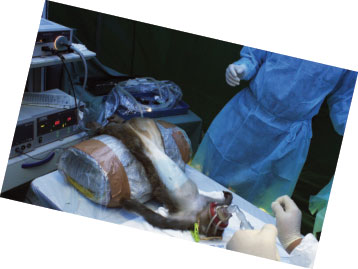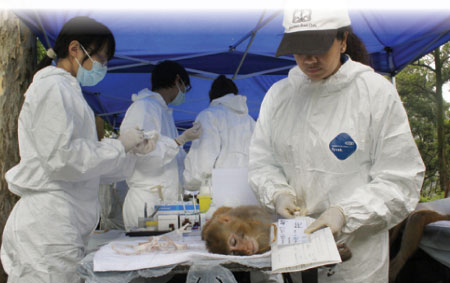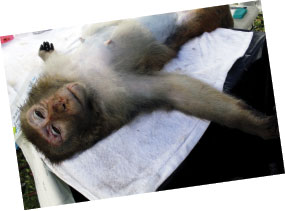Putting the brakes on monkey business
Updated: 2012-08-15 06:48
By Doug Meigs(HK Edition)
|
|||||||
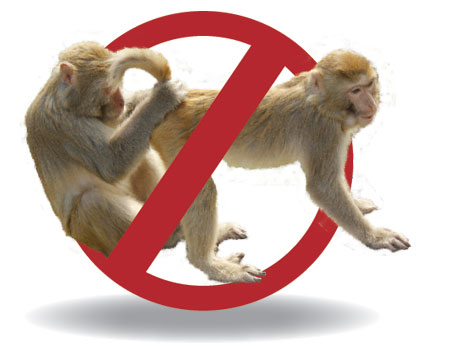
|
The caged monkey was captured as part of the Hong Kong government's campaign to control the population of wild macaques in country parks. Doug Meigs / China Daily |
|
The sterilization surgery used for female macaques is an endoscopic tubectomy. After a few minutes on the table, they recover from their tranquilizer in a cage before being released to the wild. Doug Meigs / China Daily |
|
The Agriculture, Fisheries and Conservation Department has contracted Ocean Park's veterinarians to carry out sterilization surgeries. Doug Meigs / China Daily |
|
A young mother waiting for her surgery. Public complaints against the macaques promoted sterilizations. Doug Meigs / China Daily |

Governments throughout Asia are following Hong Kong's lead in its vigorous effort to sterilize wild monkeys. The program is successful as far as it goes, though progress is impeded by park visitors who feed the monkeys. Doug Meigs reports.
Sedated monkeys are lying everywhere. A dozen veterinarians, wearing white plastic biohazard suits and blue surgical masks, set about their work among the inert bodies. One female macaque, her eyes listless and half open, lies on a folding table.
"We have a female here. She's lactating, but not pregnant," a vet shouts over the noisy rumbling of a portable electric generator. The vet presses her plastic-gloved hands firmly against the mother's furry stomach, inspecting the macaque. She is about to be sterilized. The monkey's newly born offspring can be heard hooting from a tiny cage not far away.
Nearly 2,000 macaque monkeys inhabit the city's environs. Almost 1,600 already have been sterilized according to government estimates.
Bands of macaques are an attraction for Hong Kong's hikers and nature-lovers venturing from the urban concrete jungle into the seemingly remote forests of country parks. The primates also create a huge nuisance, for the neighbors - the people who live on the fringe of the country parks; their howls of complaint moved authorities to begin a monkey sterilization program in 1999.
The Agriculture, Fisheries and Conservation Department (AFCD) began injecting the monkeys with a contraceptive vaccine. The effects of the vaccine were temporary, lasting three to five years. It didn't work. Complaints kept increasing. The monkeys continued reproducing at an alarming rate, as they rode a wave of high energy, fueled by handouts from park visitors, who refused to obey no-feeding rules. Monkeys, in their natural habitats, do find food but of a much lower energy level.
The macaques are concentrated in the hills of northern Kowloon-Kam Shan, Lion Rock and Shing Mun Country Parks - with smaller populations scattered throughout Tai Po and Sai Kung. The core habitat is intersected by trails that connect reservoirs, barbecue pits and recreational areas. They had a surplus of food. Efforts to control the macaque population needed to be increased.
A newer surgical procedure was introduced in late 2009. The sterilization technique, known as endoscopic tubectomy, has given AFCD officials hope of controlling and stabilizing the monkey populations. Complaints about the monkeys are rapidly diminishing, too. The record high of 1,400 complaints in 2006 fell to roughly 290 last year. Not so long ago, 80-90 percent of female macaques would give birth every year said AFCD conservation officer Shek Chung-tong. That's changed over the last three years and the birthrate among the monkey population is falling fast. Last year the reproduction rate was around 40 percent.
Other governments in the region are taking a hard look at Hong Kong's success, seeking solutions to their own macaque-human conflicts. Singapore sent a couple of scientists last year; Taiwan is sending a couple of observers next year. Government scientists from Malaysia are considering a research trip as well.
China Daily joined a recent AFCD sterilization during the morning at a picnic site in the heart of macaque habit, beside the Kowloon Reservoir.
Veterinarians hoist the monkeys across a makeshift assembly line of folding tables covered with white tablecloths. They say this is a small scale operation - only about 20 sterilizations today.
They sterilize monkeys during breeding season, between April and September. So far this year, they've sterilized about 168 females during 12 operations.
"Whoah, she was hungry!" one of the team exclaims. Handfuls of partially chewed peanuts spill from the macaque's mouth, while she undergoes a dental check up. Vets scribble notes onto clipboards. Another team member shaves the mother's belly using an electric razor. Then, they hoist the monkey into a green tarp enclosure, onto an operating table.
"We waited until the birthing season was nearly over so that most of the animals that were pregnant have given birth, like this one," says Paolo Martelli, the vet in charge. He wears blue surgical attire, flanked by two assistants inside the green tent.
Martelli is the chief veterinarian at Ocean Park, which introduced the tubectomy scheme and now implements the program under contract. The team works fast. Martelli makes an incision into the abdomen of the macaque. His micro-instruments cut and block the tubes leading to the monkey's ovaries.
"The tube is cauterized; the ovaries remain, so the sexual behavior remains the same," he says, while preoccupied with the surgery at hand. His eyes are glued to the computer screen displaying the inner organs of the monkey. "The macaque's hormone environment remains the same. They still come and eat, they still mate. They just don't have more babies."
"The purpose is not the extinction of the macaques," he says. "We don't want to catch them all. The purpose is birth control. We want to slow down the reproductive rate. The macaque is among the protected fauna of Hong Kong. The problem is that they have been breeding much faster than they should because of the feeding by the public."
Park visitors find monkeys begging for food year-round. At the so-called "Monkey Mountain", the parking lot is regularly full of cars and monkeys. Massive banners warn that feeding is illegal. Violators are subject to fines up to HK$10,000. Feeding continues anyway.
Earlier this year, on a brisk February day, China Daily hiked across the full extent of the macaque's core habitat. Illegal feeding was rampant. Tour bus drivers, young couples and families fed monkeys by hand in the Monkey Mountain parking lot. Fancy cars stopped on Golden Hill Road passing through the country park, and drivers tossed popcorn and other treats to the ground, creating a feeding frenzy for the viewing pleasure of children in the back seats.
One man overlooking the Kowloon Reservoir sat amid throngs of tourists photographing the monkeys. He grunted at the monkeys, as if asserting himself as the alpha-male, while eating a huge bag of fruit and threatening the macaques with a walking stick.
A media liaison for the AFCD told China Daily that about 100 fines are levied every year. Uniformed officers patrol the monkey habitat in an effort to curb the feeding. Some garbage bins are covered to prevent the animals from scavenging. To wean the monkeys from human handouts, the department has planted about 300,000 fruit trees throughout the parks to provide natural food sources.
Despite those efforts, hordes of monkeys have ran amok at the Shing Mun Reservoir's barbecue pits. The animals rushed benches, snatching plastic bags then taking flight. Kids with long sticks gleefully chased the animals, beating them away, while others monkeys assaulted the garbage bins and battled over the contents that spilled to the ground. China Daily visited again in August. Nothing had changed. The Internet carries countless blogs detailing the harrowing experiences of exchange students confronted by aggressive monkeys, who steal grocery bags, and attack hikers who try to withhold food items. YouTube videos show macaques eating from potato chip bags, or otherwise showing aggression (often in defense of their babies).
"The feeding will help them to reproduce at their maximum rate, which is higher than the natural rate of the population." Martelli says. "In their natural state, food is not always available, especially not high energy food. Some of the females will not breed. More babies will die, and of course, in a place like Hong Kong, they have very few natural predators."
Martelli says the macaque is one of the world's most successful and adaptable creatures. Certain groups of macaques in Hong Kong have even adapted distinctive cultural traits. Monkeys on the roads are more aggressive than those deeper in the woods.
The natural range of the macaques is widespread, encompassing north Africa's Barbary macaques to Japan's snow monkeys. Wherever they reside, their food scavenging rouses tensions with nearby human settlements. Martelli says Hong Kong presents a unique situation for the species. Here macaques are embraced as a protected and valuable part of the ecosystem. The monkeys are able to flourish, with 40 percent of the SAR's territory falling within country parks or otherwise protected nature areas.
Singapore might be the closest urban comparison. Singapore is considered "greener" than Hong Kong, but only 3 percent of Singapore's land area falls into protected parks, says Martelli. He worked at the Singapore zoo for 12 years before moving to Hong Kong for the Ocean Park job seven years ago. Although Singapore has greater variety of wildlife, a broader natural habitat is always preferable.
"There are always the same questions about the value of wildlife, and there are many levels of value," he says. "There is the emotional value. There is the aesthetic value, an ecological value, a utilitarian value for species that have an economic impact." The economic relevance of macaques is small for Hong Kong (they aren't eaten or sold), he says, but they are priceless for the value they provide to park visitors, for their dispersal of natural fruit seeds, and by providing Hong Kong's ecology with greater biological diversity.
Macaques were thought to have lived in the region long ago, but vanished. The present-day population finds its roots in Hong Kong's colonial government. British colonial authorities introduced rhesus macaques a century ago during construction of the Kowloon Reservoirs. The monkeys were expected to eat the fruit from strychnos plant, the source of strychnine. The poison is toxic to humans but doesn't harm macaques. The monkey population quickly boomed. In the 1950s, pet owners released long-tailed macaques, which interbred with those reintroduced by the British.
Not all governments see the value of macaques, Martelli admits. Some would prefer to kill them off. He dismissed that policy as inhumane and as well as more expensive in the long-term. The monkeys, he says, become more difficult to capture and relocate. Then they cause problems in areas where they have moved.
The endoscopic tubectomy procedure seems simple enough, but the preparations take several days. A surveyor sets out feed for the macaques inside one of many immense green cages, which the AFCD keeps throughout the macaques' range. When enough monkeys are making regular feeding visits, the door is shut with a remote control device. A monkey-catcher pushes the animals into smaller cages where they can be injected with a sedative.
The actual surgery takes Martelli only a couple of minutes. Another vet gives each monkey a small tattoo denoting what medical treatment has been undertaken and to which troupe the monkey belongs. Vets transfer the animals back to smaller cages, where they revive after the effects of the sedation wear off.
After a few hours, the AFCD releases the monkeys back into the wild. Macaques which recently gave birth reunite with their infants. But these baby monkeys will have no more brothers or sisters. There will be others nonetheless. Plenty of adult females have avoided capture to give birth again next year.
(HK Edition 08/15/2012 page4)
